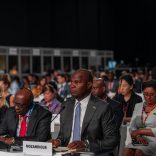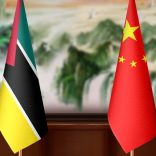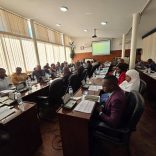Mozambique: External donations fell by almost half in 2024, totalling €520 million
Mozambique will suffer indirectly from Ukraine war but IMF predicts growth

Image VOA Portugues
The International Monetary Fund (IMF) representative in Mozambique, Alexis Meyer-Cirkel, warned on Thursday (19-05) that the country would suffer indirectly from the war in Ukraine, while still maintaining the prospects of accelerating economic growth.
“Mozambicans will really feel this crisis indirectly,” Meyer-Cirkel stressed during the presentation in Maputo of the IMF’s Regional Economic Outlook for Sub-Saharan Africa report, underlining the recent increase in the price of fuel and cereals.
In some provinces “bread makers are adjusting bread prices in response to rising wheat prices,” Meyer-Cirkel said.
The IMF predicts that inflation could reach 9% this year and then slow down to 7% in 2023.
The IMF representative further noted that, in addition to Russia’s invasion of Ukraine, the world is not yet completely free from Covid-19.
Even so, with regard to the pandemic, Meyer-Cirkel considers that Mozambique is progressing at an encouraging pace, with very advanced vaccination rates.
In general, “the outlook for Mozambique is better than the average for Sub-Saharan Africa, especially in the coming years, with the expectation about gas” and the start-up of projects in the Rovuma basin, he added.
His outlook is presented after the IMF on May 9 approved a financing agreement with Mozambique for the period through to 2025 worth US$470 million (€445 million).
IMF forecasts point to 3.1% growth in Mozambique’s gross domestic product (GDP) this year, accelerating to 5% in 2023 and 8.3% in 2024.
Mozambican government forecasts indicate economic growth of 2.9% this year, as per the Economic and Social Plan and State Budget approved by parliament in December, but without taking into consideration the global risks triggered by the war in Ukraine.
Meyer-Cirkel says that the ambition to maintain economic stability in the midst of a war requires a different posture, and, while conceding the country’s ability to collect revenues and taxes, warns that Mozambique needs to control the increase in public debt.
IMF forecasts point to public debt remaining around 102% of GDP this year, falling to 94.8% in 2023.
For Meyer-Cirkel, the main risks for the Mozambican economy continue to be armed violence in Cabo Delgado, a province terrorized by armed rebels since 2017, persistent fears surrounding Covid-19, and natural disasters.
“Specifically, terrorism increases fiscal pressures, delays the gas projects and increases poverty and inequality,” he said.
With a financing agreement signed with Mozambique, an important signal for the international financial market, the IMF representative understands that investment in human capital and diversification of the economic base remain among the main necessary reforms.












Leave a Reply
Be the First to Comment!
You must be logged in to post a comment.
You must be logged in to post a comment.